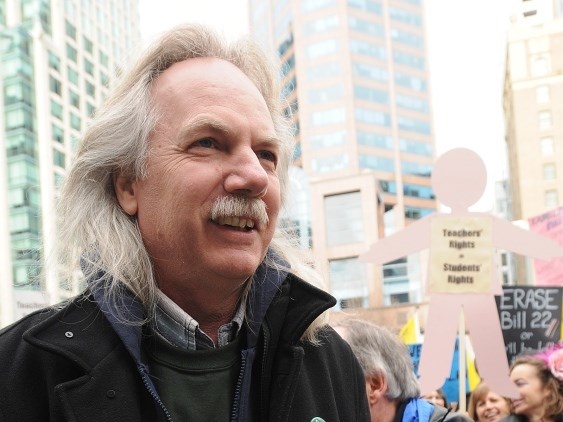The B.C. Teachers’ Federation will hold a strike vote March 4 to 6 and announce results on the evening of March 6.
BCTF president Jim Iker told reporters Tuesday morning “it’s very, very likely” the vote will pass.
Iker said the teachers’ federation opted to put pressure on the government with a strike vote after a year of bargaining and more than 40 sessions at the table to push back against unreasonable offers.
He said the B.C. Public School Employers’ Association tabled language that again would strip provisions on class size, class composition and staffing levels for teacher-librarians, counsellors, special education and other specialist teachers.
The government has offered a 0.5 per cent increase on the date of ratification that’s not retroactive. The government’s contract with teachers expired last June, so Iker said this means teachers received no pay increase in 2013-2014, would receive no increase for 2014-2015, with various 1 per cent and 0.5 per cent increased over the following four years.
He said Premier Christy Clark has told the public the province wants a 10-year deal with teachers but the BCTF sees a different story behind closed doors.
BCPSEA chief negotiator Peter Cameron said the BCTF broke protocol by revealing details of a first offer.
“If the union wants to get into that kind of debate they do have an obligation to put their position forward for public discussion,” he said.
The announcement of a strike vote follows last month’s B.C. Supreme Court decision that provincial legislation limiting teachers’ bargaining rights is unconstitutional. Justice Susan Griffin ruled the government must restore collective bargaining provisions that relate to class size and composition and the number of supports provided in classes for special needs. Language will be returned to their collective agreement retroactively but would likely be the subject of ongoing collective bargaining, she wrote. The government is appealing the decision.
Cameron said the government wants to reach a 10-year agreement with teachers to counteract the long-term toxicity between teachers and the government with stability.
He said a 10-year agreement includes the right to negotiate mid-contract.
“The only difference between a full expiry and the right to strike would be for that one set of re-openers, that would go to a third party instead of a right to strike or lock-out,” Cameron said.
The strike vote coincides with the BCTF’s return to the bargaining table with the provincial government. Negotiations are scheduled for March 4 to 7, 11 and 12.
Vancouver School Board chairperson Patti Bacchus says agreements made in bargaining must be fully funded by the government. The district has struggled to fund previously negotiated wage increases.
Once a strike vote is taken, a union has 90 days to activate it with job action. Iker says no matter what happens, the BCTF will continue to negotiate at the table.
Any job action would happen in stages. Iker said initial action would not include immediate school closures or interruptions for students, teachers halting participation in extracurricular activities or disruption with report cards or communications with parents.
The BCTF says any escalation of job action would depend on progress at the negotiating table.



